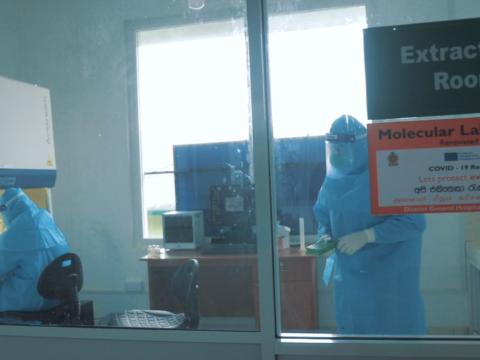A lab that brought change

Affordable and accurate laboratory test is crucial for timely diagnosis and appropriate treatment of the Covid-19 patients.
By the time when the dangerous agent of the Covid-19 was identified as a novel Corona Virus, no country in the globe had a laboratory with a diagnostic capacity to detect this new virus. A strategic approach, regional trainings, national missions and technical support was established world-wide for timely preparedness of nation-wide laboratories for Covid-19 detection.
Sri Lanka is not an exception among these nations. The country with very limited number of laboratories that can detect SARS – CoV – 2, had no coordinated and efficient laboratory response for preparedness.
“In 2020, people here in Nuwara Eliya stand in queue for hours to get their samples collected to be tested against Covid-19. Our hospital staff had to bring the samples to a laboratory in Kandy and it took nearly 2 to 3 days for us to get the results, while also risking congestion and contamination” says Dr Chandini Mendis, Consultant Microbiologist at the District General Hospital, Nuwara Eliya.
“Nevertheless, day by day with an overwhelming number of patients and potentially large numbers of Covid-19 cases with no similarities among them and increase in the asymptomatic cases, the hospital encountered enormous challenges in rapidly and accurately diagnosing the infected persons. And we badly needed an infrastructure that can effectively diagnose the disease, track its progression in order to isolate patients for special care and thereby to prevent the spread of disease”, she says.
“We approached the director of our hospital and emphasized the importance of having our own molecular laboratory as a part of the prevention against Covid-19. Molecular tests would help us identifying where the virus is hiding in the body, which is the basic of blocking the chain of transmission. He suggested to install the laboratory in a container as we had no space available for the hospital. But we insisted on having a permanent structure that could serve generations after generations”.
“With god’s grace, we were a given space which used to be an abandoned ward earlier. So now, we needed funds to establish the lab. That is where we got to know about the Covid-19 Prevention Project of World Vision Lanka. Supported by the European Union Civil Protection and Humanitarian Aid, the project agreed to fund for the laboratory establishment” she smiles.
This newly established laboratory with essential medical supplies and equipment is currently serving the patients not only from the district of Nuwara Eliya but also from 2 to 3 nearby districts. On the days where Covid-19 was in its highest range, this lab has regularly capacitated at least 600 – 700 patients, who got their samples tested, just in five hours of time.
The doctor continues “this lab is not just meant for Covid-19. It can facilitate any bio molecular testing and diagnosis. With the increasing threats imposed by the global warming, we have emerging and re-emerging diseases, like Monkey Pox, which are a real danger to the humankind. These diseases also have to be identified through molecular testing”.
“People these days are more concerned about non-communicable diseases like diabetes and cardiac disorders but they hardly realize that the communicable diseases are more dangerous. But this structure is developed and equipped in a way that can detect fungi, bacteria and parasitic infections that are severely transmissible”, she says.
She sums up “Unlike other countries, Sri Lanka has a health system that serves for its people free of charge and well-educated group of staff working in the system. Our only problem is the inadequate funding for proper and sustainable infrastructures and medical supplies. I am glad this laboratory will continue to serve generations”.
Supported by EU, World Vision Lanka is implementing Covid-19 Prevention Project to strengthen the health system and to enhance Covid-19 prevention, care, and treatment capacity. The project focuses on establishment of proper health care system, provision of essential equipment and improving access to vaccination for the most vulnerable groups, including the elderly and persons with a disability.
This project in collaboration with Ministry of Health and WHO brings impacts on 103,000 patients, 3,000 healthcare workers and 1,000 people with disabilities through 29 Covid-19 treatment facilities in 8 districts in Central, North Eastern, North Western and Western provinces in Sri Lanka.